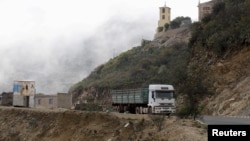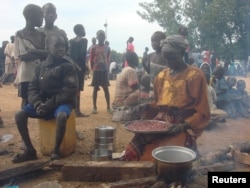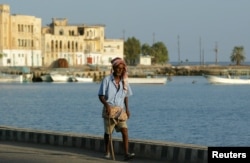Eritrea allowed use of one of its ports for a food aid shipment to South Sudan, marking the first time the World Food Program has used food assistance operations in Eritrea since 2006.
A relatively small pilot shipment of 1,100 metric tons of sorghum was offloaded in the port at Massawa, Eritrea, in early June, and delivered to Kosti, Sudan.
Challiss McDonough, senior regional spokeswoman at the World Food Program (WFP) in South Sudan, said the sorghum was added to other food aid and then moved to South Sudan. Last year, WFP distributed in South Sudan 190,000 metric tons of food from different countries in the region.
The humanitarian situation in South Sudan is dire, with more than 40 percent of the population facing severe food insecurity, McDonough said.
More than two years of conflict and an economic crisis, combined with a lack of rainfall caused by the climatic event El Nino, mean that harvests and food availability are at historic lows. Fighting has killed tens of thousands of South Sudanese and forced more than 2 million to flee their homes, and much of the country is not accessible by any network of roads.
'Humanitarian crisis'
“It’s a very complicated situation with a serious humanitarian crisis and logistically difficult place to reach people,” McDonough told VOA. “The ability to provide humanitarian assistance right now is absolutely vital. It is life-saving, but, in the long term, you can’t end this crisis with humanitarian assistance.
"It takes the guns falling silent and it takes the parties to the conflict reconciling and allowing people to get back to their lives," she added.
The WFP said humanitarian responses require regional collaboration. The agency ships food to South Sudan through ports in Djibouti, and Mombasa, Kenya. It also uses planes based in Ethiopia to air drop food to remote locations.
McDonough said the food aid delivery using Massawa was successful and would add an alternative route in one of the most challenging operational environments in the world. Additionally, it using Massawa would ease the pressure on other corridors, she said, noting that the “Djibouti port can be very congested."
However, the shipment through Eritrea has proved slower and more expensive when compared with the other corridors, she said. “But maybe there’s a way of bringing the costs down. And if it were a corridor we would use more often, maybe there are ways of speeding it up," she added.
Since gaining its independence in 1991, Eritrea has had tense relations with humanitarian agencies.
In July 2005, it asked the United States Agency for International Development to terminate its operations and leave the country. It continued expelling other international organizations from working within the country in 2006.
More engaging
Diplomats said they believe allowing the use of the Massawa port is evidence that Eritrea is opening up and willing to engage more with the world.
Louis Mazel, charge d’affaires at the United State Embassy in Asmara, Eritrea, said, “This is a win-win-win for the country,” due to its potential to create jobs at the port and in the trucking industry, as well as promote regional integration.
Writing on the embassy’s official Facebook page, Mazel said food aid would reach South Sudan “more quickly” as Eritrea tries to “become part of the solution in helping facilitate humanitarian relief.”
McDonough said a trial run at Massawa was necessary due to the length of time the port has been out of use for such efforts. "We needed to test out the port facilities, housing and the transport infrastructure," she said.
“We’ve seen this resurgence of fighting in the capital and there are reports of fighting in other parts of the country," McDonough said. "I think South Sudan is on a precipice."
She said the WFP has mounted an "enormous" humanitarian response, possibly "averting a catastrophe, but it can't be maintained forever."
Eritrean authorities said the food aid shipment may be the beginning of a more collaborative relationship between the two countries.
The Eritrean Information Minister Yemane Gebremeskel hinted that there are other regional collaborations in the works. On June 24, Eritrea and South Sudan “signed a civil aviation agreement to enhance weekly flights between the two countries,” he tweeted.











